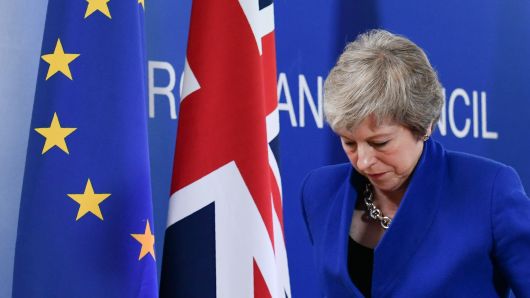Sterling slid nearly half a percent on Monday on rising concerns about the progress of Brexit negotiations and worries Prime Minister Theresa May is facing a mounting challenge to her leadership.
May is set to meet Graham Brady, chairman of an influential committee representing members of parliament from her Conservative party, amid calls for her to set a date to step down, the BBC reported.
“Currently Theresa May is walking on thin ice as the latest reports indicate a revolt against her could take place. MPs (Members of parliament) are probably not satisfied with cross-party talks so far. Therefore the pound is being dragged down as another dose of uncertainty hits the market,” said Marc-André Fongern of MAF Global Forex.
The British currency was generally weak across the board, reserving some of its biggest losses against the dollar and the low yielding Japanese yen.
Against the dollar, the pound slipped as much as 0.5 percent to $1.3040 before recovering slightly to trade 0.4 percent down at $1.3051.
It also weakened a quarter of a percent against the euro at 85.69 pence and 0.7 percent against the yen at 144.21 yen.
A dollar rising at the start of the U.S. trading session also hit the pound.
“There is broad dollar strength across the board but it is being felt more acutely through sterling,” said Kamal Sharma, a director of G10 FX strategy at Bank of America Merrill Lynch.
Britain’s Conservative government and the opposition Labour Party resumed Brexit talks to try to find a way to break the deadlock in parliament over the country’s departure from the European Union.
May agreed a withdrawal deal with the EU last year, but it was rejected three times by a deeply divided British parliament. That delayed the exit date, a postponement that has weighed on the pound as investors fret about prolonged political uncertainty.
Sterling has traded in a narrow range of $1.28-$1.31 since Britain pushed its scheduled departure from the European Union back from March until Oct. 31. There is still little clarity about when, how, or even if, Brexit will happen.
Investors have been broadly impervious to tepid economic data recently and even relatively hawkish comments from the Bank of England last week failed to jolt the currency.
Overall volatility in the currency markets remained near five-year lows and net positions by hedge funds in sterling have slipped back into negative territory.
Source: Reuters













